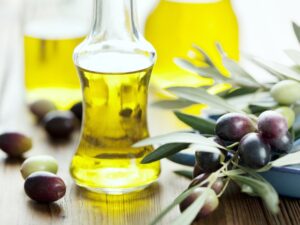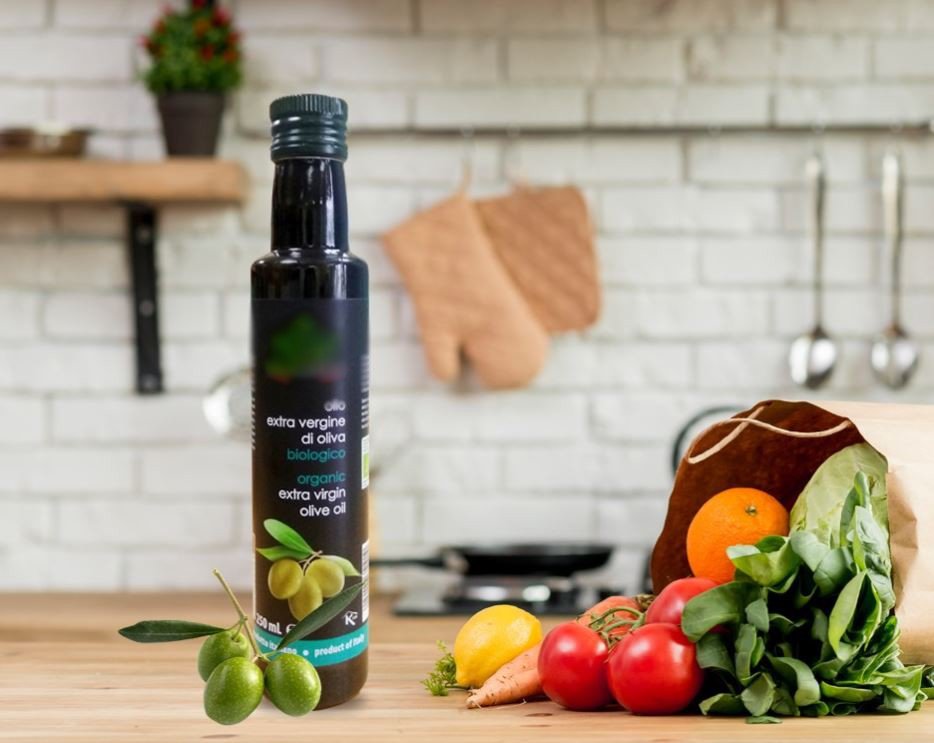1. Ensures Nutrients in Olive Oil
- Calories: 119
- Total Fat: 13.5g
- Saturated Fat: 2g
- Monounsaturated Fat: 10g
- Polyunsaturated Fat: 1.5g
- Vitamin E: 12.9% Daily Value (DV)
- Vitamin K: 6.8% DV

2. Olive oil is rich in healthy fats.
The U.S. Department of Agriculture (USDA) recommends that consumers obtain 20% to 35% of their daily calories from fats, primarily unsaturated fats. Cold-pressed olive oil includes almost all types of fats, with 71% coming from an unsaturated fat known as oleic acid. Studies show that oleic acid and other unsaturated fats can help reduce harmful LDL cholesterol when used instead of saturated fats.
Furthermore, 11% of the fat in cold-pressed olive oil comes from omega-6 and omega-3 fatty acids. These two unsaturated fats support health by regulating blood pressure, blood clotting, and balancing immune system responses.
Although olive oil contains 2 grams of saturated fat in a tablespoon (15ml), this amount still falls within the recommended limits of 13 to 22 grams set by most health agencies based on a standard 2,000-calorie diet.
3. Olive oil contains antioxidants.
Cold-pressed olive oil can retain more antioxidants than lower-grade olive oil because it is not processed with heat. Antioxidants protect the body from unstable molecules known as free radicals, helping the body avoid chronic diseases such as heart disease, diabetes, and cancer. Each tablespoon (15 ml) of olive oil contains 12.9% of the daily value (DV) of vitamin E—a vital nutrient and powerful antioxidant.
Cold-pressed olive oil is also rich in plant compounds such as oleuropein and hydroxytyrosol, which have demonstrated strong antioxidant properties in animal studies and test tubes.
4. Anti-inflammatory properties
Chronic low-grade inflammation is thought to be the cause of many serious diseases, including heart disease, diabetes, cancer, arthritis, and Alzheimer’s disease. Studies have shown that olive oil may help reduce inflammation due to its high concentration of healthy fats, antioxidants, and compounds like oleocanthal. Oleocanthal is a natural anti-inflammatory. In vitro studies suggest it works similarly to ibuprofen, a medical anti-inflammatory drug; however, human studies are needed to confirm these results.
However, replacing foods high in saturated fats—such as butter and lard—with cold-pressed olive oil is a sensible decision for improving health.
5. Reduced risk of heart disease
Heart disease is the leading cause of death for both men and women worldwide, accounting for over 17 million deaths each year. Numerous studies reveal that substituting saturated fat-rich foods with olive oil can help lower LDL cholesterol (the harmful kind) and high blood pressure—two main risk factors for heart disease.
One study involving 84,000 women showed that replacing 5% of saturated fat with foods high in monounsaturated fats, including olive oil, was associated with a 15% reduction in the risk of heart disease.
6. Enhancing Brain Health
A diet supplemented with cold-pressed olive oil has been shown to support brain health. The MIND diet is a recommended guideline for consumers to cook with olive oil.
In population studies, individuals following the MIND diet showed a slower decline in memory associated with aging and age-related factors, as well as after a stroke. A 4.5-year study involving 923 people found that the incidence of Alzheimer’s disease decreased by 53% among those who strictly adhered to the MIND diet.
7. Other Health Benefits
Although the number of studies is limited, cold-pressed olive oil may offer potential health benefits. These include:
- Reduced risk of type 2 diabetes. Studies in individuals with diets supplemented with olive oil – up to 1.5 tablespoons (20 ml) per day – showed a 16% lower risk of developing type 2 diabetes.
- Improved blood sugar levels. In a small study, participants taking 20 mg of oleuropein, a compound in olive oil, exhibited 14% lower blood sugar levels after meals compared to those who did not take it.
- Reduced constipation. According to some small studies, consuming at least 1 teaspoon (5 ml) of olive oil daily may help treat constipation.
- Preventing osteoarthritis. Animal studies have shown that olive oil and its compounds may combat the process of osteoarthritis by preventing cartilage damage, the protective cushion in joints.
8. Beneficial for hair, nails, and skin
- Hair treatment. Using 1 tablespoon (15-30 ml) of olive oil can help treat split ends or be gently massaged into the scalp to reduce dryness.
- Moisturizing. To hydrate the skin, apply a thin layer of olive oil after bathing or mix a small amount of oil into your regular moisturizer before using it.
- Conditioning the cuticles. Massage a drop of olive oil into each fingertip to treat cracked, broken, or dry cuticles.
9. Easy to incorporate into the diet
- When cooking, substitute butter or lard with cold-pressed olive oil.
- When making salad, instead of buying pre-made dressings at the supermarket, use olive oil as the dressing base.
- Choose dressings made from olive oil, such as pesto, over creamy or cheese-based options.
- Instead of spreading butter on bread, dip the bread in cold-pressed olive oil and sprinkle with seasoning.

